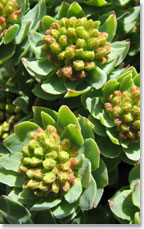 Rhodiola rosea (Golden Root, Roseroot, Aaron’s Rod) is a plant in the Crassulaceae family that grows in cold regions of the world. These include much of the Arctic, the mountains of Central Asia, the Rocky Mountains, and mountainous parts of Europe, such as the Alps, Pyrenees, Carpathian Mountains, Scandinavia, Iceland, Great Britain and Ireland.
Rhodiola rosea (Golden Root, Roseroot, Aaron’s Rod) is a plant in the Crassulaceae family that grows in cold regions of the world. These include much of the Arctic, the mountains of Central Asia, the Rocky Mountains, and mountainous parts of Europe, such as the Alps, Pyrenees, Carpathian Mountains, Scandinavia, Iceland, Great Britain and Ireland.
Rhodiola (Rhodiola rosea) is a botanical medicine that is useful as a treatment for stress. It is known as an adaptogen herb; helping the body to cope with stressful situations by reducing the overall stress response. Rhodiola also helps maintain balance in the hormonal systems that operate in the body.
Rhodiola rosea may be effective for improving mood and alleviating depression. Pilot studies on human subjects showed that it improves physical and mental performance, and may reduce fatigue.
Rhodiola rosea’s effects are potentially mediated by changes in serotonin and dopamine levels due to monoamine oxidase inhibition and its influence on opioid peptides such as beta-endorphin, although these specific neurochemical mechanisms have not been clearly documented with scientific studies. Rhodiola is included among a class of plant derivatives called adaptogens which differ from chemical stimulants, such as nicotine, and do not have the same physiological effects.
In Russia and Scandinavia, Rhodiola rosea has been used for centuries to cope with the cold Siberian climate and stressful life. Such effects were provided with evidence in laboratory models of stress using the nematode C. elegans, and in rats in which Rhodiola effectively prevented stress-induced changes in appetite, physical activity, weight gain and the estrus cycle.
Research with animals has demonstrated protective effects of rhodiola extracts against physical stress. A study of healthcare workers experiencing the stress from working nightshifts concluded that taking rhodiola prevented mental decline during neuropsychological performance tests. In a double-blind study is Russia, rhodiola was given to medical students during medical exams over 20 days. Those taking the extract had improvements in physical fitness, mental fatigue, and motor function tests as well as an increased sense of well-being.166
Rhodiola reduces levels of the stress hormone cortisol, while optimizing levels of key brain chemicals involved in mood. It also appears to boost synthesis of a molecule known as adenosine triphosphate, which cells need to produce energy.